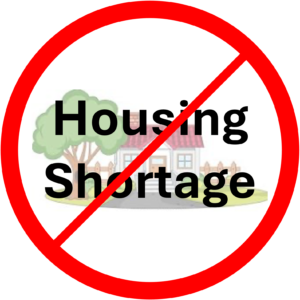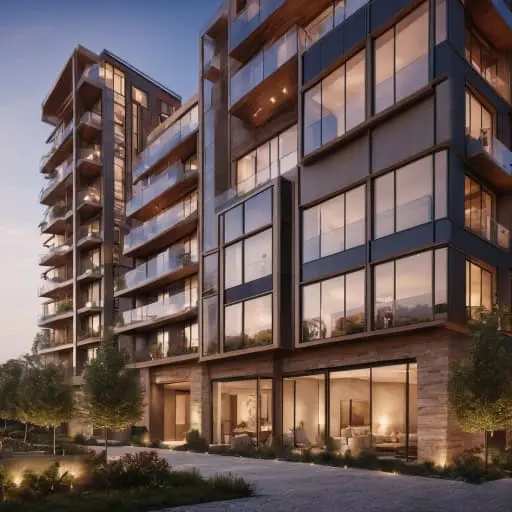In Lawrence County, PA, like many communities across the US, there is a critical shortage of quality, market-rate homes and apartments for working-class families. Much of the available housing is outdated or substandard, negatively impacting the local economy, job market, infrastructure, and quality of life. However, solutions exist. By fostering collaborations between local governments and dedicated local real estate developers, we can quickly and effectively improve living conditions and revitalize the community.
This housing shortage creates significant problems. Numerous families throughout Lawrence County and New Castle, PA have no choice but to live in inadequate conditions, negatively impacting their health and well-being. Additionally, economic growth is hindered as potential residents and businesses are deterred from the area due to the lack of suitable housing, resulting in stagnant community development and a diminished quality of life for many residents.
Collaboration between municipalities and real estate developers can address this effectively. By fostering strong relationships with experienced and community-focused developers, local governments can harness numerous social, physical, and economic benefits, driving revitalization and improving living conditions.
The Negative Impact of the Housing Shortage

A national perspective emphasizes the urgency of addressing this housing shortage. Freddie Mac’s report, “Housing Supply: A Growing Deficit,” highlighted that the U.S. faced a 3.8 million housing shortfall by the end of 2020. This deficit has significantly increased through 2024, as detailed in a recent report by Multi-Housing News, noting that “the availability of quality housing stock in the U.S. has reached an all-time low.” Currently, there is a rental shortage of over 7.3 million units in 2024.
The housing crisis in the United States is a pressing issue. Building strong partnerships between local governments and private real estate developers is essential to remedy this dilemma. These collaborations will effectively boost the supply of quality housing for middle-income families, tackling the core problem. Additionally, such efforts stimulate local and national economies by supporting the largest segment of the population: middle-income families. The synergy between public and private sectors is vital for resolving the housing crisis and nurturing vibrant communities in Lawrence County, New Castle, and nationwide.
Consequences of Local Government Inaction on Developer Collaboration
On the other hand, when local governments fail to collaborate with developers, communities often face economic decline, increased blight, and job losses due to a deteriorating housing stock, as the present status reflects. This lack of cooperation results in long-term negative impacts on the local economy, residents’ quality of life, the development and maintenance of public infrastructure and services, and the overall beautification of the communities.
The current shortage of quality, market-rate homes and apartments creates critical problems, among them:
- Decreased Quality of Life: Residents don’t have a choice but to live in substandard conditions, negatively impacting their health, well-being, and overall quality of life.
- Economic Stagnation: Outdated housing deters new businesses and residents from moving to the area, hindering economic growth and reducing local job opportunities.
- Increased Blight: Poor housing conditions lead to neighborhood decline, resulting in abandoned properties and a lack of community investment.
- The flight of Families and Businesses: Families and businesses relocate to areas with better housing options, abandoning areas with poor and limited stock of quality homes, further depleting the local economy and diminishing community vitality.
- Rising Housing Costs: The shortage drives up prices, based on the principle of “supply and demand” (reduced supply creates demand that increases costs by default), making it harder for middle-income families to find quality homes they can afford and exacerbating socio-economic disparities.
In Lawrence County, and particularly in New Castle, PA, these issues are evident. Families struggle to find suitable housing, which in turn hampers community development and local economic progress. This was my personal experience when I moved to the area with the intention of living in the city of New Castle, PA near the church that my wife and I attend. We had to move about an hour away due to the unavailability of suitable housing in the New Castle area, a predicament that persists today. This echoes the experiences of numerous other families in the area who have expressed the same housing challenge.
The Lawrence County Housing Authority emphasizes the need for better housing options to support community well-being and growth. However, public housing agencies mainly focus on low-income and affordable housing, often overlooking market-rate housing for middle-income families, which is the primary cause of the current crisis. To address this, it’s crucial to enable local developers to create market-rate housing rather than relying solely on public housing solutions like Section 8.
Middle-income families are the largest income segment in the US. While low-income and affordable housing programs are essential, a balanced mix of market-rate, deluxe, and affordable housing is crucial for a healthy local and national economy. An overabundance of low-income housing can lead to economic imbalance, housing shortages for the majority, and community decline, resulting in blight, flight, deterioration, and other crises.
At Metrovitalization we strive to enhance housing in Lawrence County and Northwest Pennsylvania, and we’ve been partnering with individuals and entities that share our vision. Although we are a for-profit company, our mission is community-focused and centered on revitalization, as reflected in our name. For insight on the impact of new homes on the quality of life in a community, see my recent short article: “New Quality Homes Improve the Quality of Life in Lawrence County For a Wide Range of Family Budgets”.
Collaborative Solutions
The solution to the crisis starts with effective collaborations between municipalities and dedicated real estate developers, as this directly addresses the widespread housing shortage problem that has negatively impacted communities like Lawrence County and New Castle, PA for many years. Here are two case studies that illustrate this type of collaboration:
- Bringing Public Land to the Table: In Austin, TX, the local government partnered with developers to repurpose public land for new housing developments. This initiative provided new quality homes and revitalized underused areas, benefiting the entire community (https://www.austinmonitor.com/stories/2022/12/council-to-establish-consistent-practices-for-redeveloping-city-owned-land/)
- Creative Public Financing Spurs New Middle-Income Homes: Programs like New York’s Mitchell-Lama Program, which offered low-interest mortgage loans and guaranteed returns to developers, were successful in creating middle-income housing and significantly boosting the local economy. (https://www.nixonpeabody.com/insights/alerts/2024/05/09/the-new-york-housing-for-the-future-homeownership-program)
For further insight into strategic collaborations, see my brief article “City and Developer Strategic Alliances: The ‘Secret Sauce’ for Sustainable Development”.
Effective Strategies

I offer the following proven strategies that local governments can deploy to address the housing shortage swiftly. These methods involve collaborating with dedicated developers to revitalize communities through public-private partnerships and other incentive programs:
- Streamline Approvals and Permitting: Lengthy permitting delays are direct barriers and deterrents for quality home construction. For instance, acquiring local and state (DEP) permits for our Kingdom Place development has taken over 253 days although the project was approved by the local government and the state. This process deters developers and impedes necessary housing solutions. Local governments can incentive development by accelerating processes with fast-track systems for state, county, and municipal permits, while maintaining regulatory standards. Quick online permit review processes and dedicated government staff for fast approvals can significantly speed up development, incentivizing developers and boosting local economies. Enhancing these processes to streamline approvals and permits is a worthwhile investment for state, county and local government agencies, as it generates an economic boost for their respective areas.
- Financial Incentive Programs: Offering quick grants and low-interest loans to developers who build quality homes for middle-income families in areas with housing shortages, like Lawrence County and New Castle, PA, can be a very effective strategy. These financial incentives stimulate development and address housing needs rapidly.
- Utilize Public Land: Municipalities, counties, and the state can spur development by providing public land in strategic locations like downtown New Castle, PA and its surrounding areas, at minimal or no cost to incentivize new-construction, market-rate housing developments.
- Upzoning and Regulatory Changes: Modifying zoning laws to permit higher-density housing can boost the availability of new, high-quality homes in specific urban areas, while preserving the less densely populated rural regions.
- Public-Private Partnerships: Establishing partnerships with private developers can leverage additional resources and expertise to create more housing options for local families.
- Support Housing Finance Agencies: Municipalities can back housing finance agencies to fund and incentivize the development of middle-income homes, townhomes, rental apartments, and condominiums. Balancing affordable and high-end housing helps attract wealth to the area and prevents economic imbalances and blight.
- Community Engagement: Engaging the community in the planning and development process can build support, reduce opposition, and ensure that new projects meet local needs.
- Infrastructure Investment: Investing in infrastructure improvements can make areas more attractive for development and support higher-density housing developments.
By implementing these strategies, government agencies can work effectively with developers to alleviate the housing shortage and improve community well-being.
Joint initiatives often incorporate sustainable practices and green building standards, reducing the environmental impact of new developments. This focus on sustainability helps create healthier, more resilient communities.
By harnessing the synergies between municipalities and developers we can foster comprehensive community development, yielding lasting benefits for all stakeholders. Healthy public/private collaboration efforts that incorporate the above strategies attract businesses and residents, bolster the local economy, and revitalize neglected areas into vibrant neighborhoods. This process creates employment opportunities, enhances the area’s aesthetics, and upgrades infrastructure resulting in a healthier sustainable environment.
In Summary

The path to revitalizing Lawrence County, PA, lies in addressing the critical housing shortage with innovative, quality solutions, as economic growth naturally follows residential expansion due to the increased consumer spending of new residents in an area.
By fostering collaboration between local governments and dedicated real estate developers, we can transform outdated and substandard areas into vibrant, livable, and sustainable communities. This partnership approach not only provides much-needed market-rate homes and apartments for middle-income families, but it also stimulates economic growth and area beautification, improved public services, and social equity.
With strategic initiatives and a commitment to sustainable development, we can create a brighter future for Lawrence County, PA improving the quality of life for its residents and ensuring a thriving, resilient and sustainable community.
Share your thoughts and comments or connect with Metrovitalization here.
About
Ricky Trinidad is an Official Member of the Forbes Business Council, and the Modular Home Builders Association, and President of Metrovitalization, an urban planning, development, and construction company in Pennsylvania that specializes in sustainable and community-conscious real estate development, focusing on revitalizing areas physically, economically, aesthetically, spiritually, and environmentally with a unique approach that integrates high-quality construction with a commitment to community enhancement.
Share your thoughts and comments with me here
Hashtags
#LawrenceCountyRevitalized #QualityHousingSolutions #CommunityRevitalization #EconomicGrowth #LocalGovernmentPartnerships #RealEstateDevelopment #AffordableHousingInitiative #SustainableCommunities #MarketRateHomes #PublicPrivatePartnerships #CommunityTransformation #UrbanRevitalization #ImprovingQualityofLife #HousingShortageSolutions #RevitalizeNewCastlePA #RickyTrinidad #Metrovitalization





